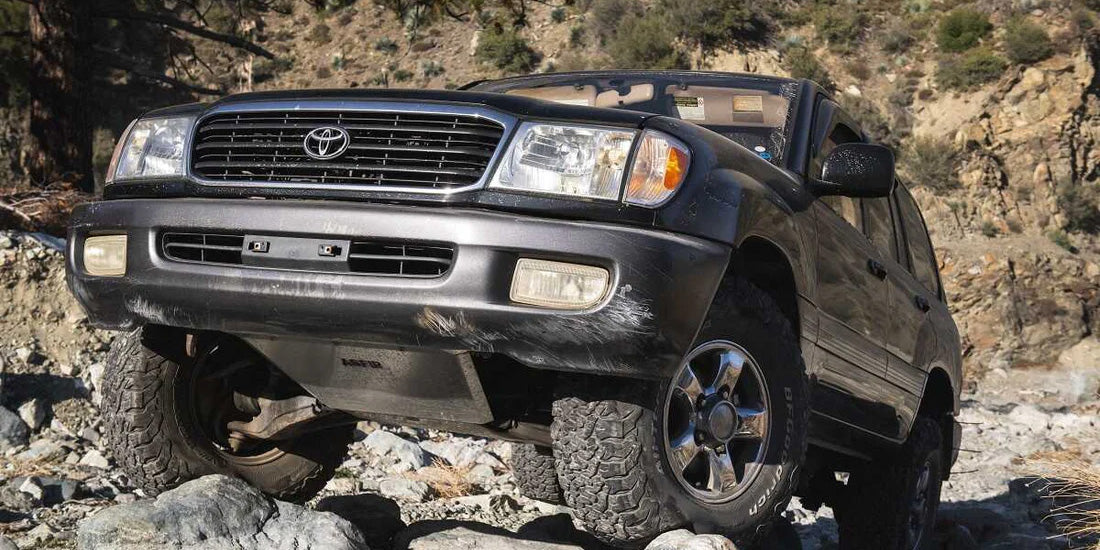Congratulations! You’ve decided to protect your off-roader with a set of skid plates. Here are you main considerations you should think through when choosing your skid plates:
-
What type of off-road activities do you do?
|
Activity Type |
Description |
Use Cases |
Skid Plate Material Recommendation |
|
General Off-Roading / Weekend Warrior |
This covers a broad range of activities, from exploring forest roads and light trails to tackling moderate obstacles. Very often the vehicle will also be used as a daily driver for work and errands. |
Forest trails, fire roads, moderate dirt tracks, occasional mud or water crossings, camping trips with off-road access. |
Aluminum skid plates will provide good all-around protection against common trail hazards, with their great balance of strength and weight. |
|
Overlanding / Expeditions |
Long-distance, self-reliant vehicle-based adventures to remote destinations. The emphasis is on travel, exploration, and carrying necessary gear, often involving sustained periods away from paved roads. |
Multi-day or multi-week trips across various terrains (dirt, gravel, sand, some moderate rock sections), remote camping. |
Aluminum skid plates will provide reliable protection with a strong emphasis on weight savings, which will maintain fuel economy and reduce suspension strain over long distances. Corrosion resistance is also key for diverse environments. |
|
High-Speed Desert Racing / Baja Style |
Fast-paced driving across open desert, sand dunes, and sometimes rocky terrain. High speeds mean impacts can be sudden and severe, but also that vehicle agility and reduced unsprung weight are paramount. |
Desert races, recreational high-speed desert runs. |
Aluminum is recommended due to weight savings for performance, and impact absorption properties. |
|
Intense Rock Crawling |
This involves navigating extremely challenging terrain with large rocks, steep inclines, and deep ruts, often at very low speeds. The focus is on precision driving and overcoming significant obstacles. |
Technical trails, rock gardens, competitive rock crawling events. |
Either aluminum or steel for maximum impact protection, rigidity, and resistance to deformation from direct, sharp impacts. |
-
What is the climate in your area?
If you live in a region with high humidity, frequent rain, or areas with snowy winters and high usage of salt to clear the roads, corrosion resistance is crucial. Aluminum skid plates are recommended to reduce risks of corrosion.
-
Are you interested in DIY installation and vehicle maintenance?
If you’re interested in DIY installation:
-
Aluminum’s lighter weight will make it easier to place and install in a driveway with jack stands.
-
Bolt-on skid plates with a perfect fit will save you work on adapting the chassis for the plates - no welding, drilling, or cutting required.
-
A modular design will be easier to install piece by piece.
If you’re interested in maintaining your own vehicle:
-
Designs with openings for routine maintenance such as oil changes will make routing maintenance easier.
-
Modular designs will make it easier to access or remove
-
Steel plates will require regular inspection, and potential touch ups to prevent rust and corrosion
-
What is your budget?
-
Aluminum plates have a lower risk of corrosion, making them last longer
-
Modular designs will be easier to buy and install piece by piece as specific needs arise. Instead of starting from a full bellypan, you can have the flexibility of protecting different parts as you go.
-
Bolt-on designs will be easier to replace, and can even be removed and sold separately from your vehicle when it’s time to upgrade.
Summary
For almost all use cases, climates, budgets and drivers, choose Aluminum, modular, bolt on skid plates for your vehicle.
Asfir skid plates are engineered to meet the demands of every off-road enthusiast. With a modular, bolt-on design that guarantees a 100% perfect fit, these skid plates are built for the trail, ensuring superior protection and ease of installation for all your adventures.

